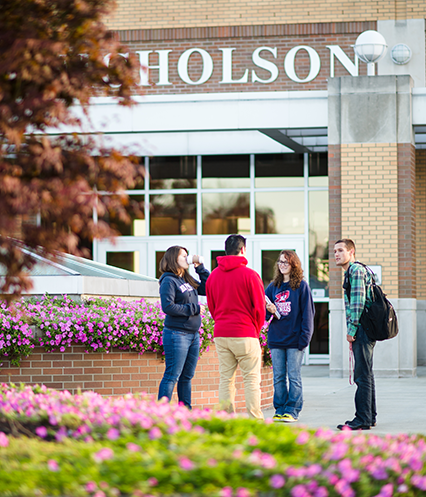Newsroom
RMU 100 Plan
New strategic plan sets goals and benchmarks through RMU's 100th year in 2021.

Under Robert Morris University’s latest strategic plan, the university will use Gallup research and powerful new technologies to boost retention and graduations rates, launch students into great careers, and continue RMU’s rise as a nationally ranked, doctoral-granting university.
The RMU Board of Trustees recently approved the strategic plan, RMU 100: Strategic Plan 2018-2021, which took effect January 1 and sets goals and benchmarks for the university through its 100th anniversary in 2021. The plan also carves out a substantial role for RMU in driving economic growth in the Pittsburgh region.
“RMU 100 will propel the university into its second century. It is a bold and innovative plan that is nonetheless rooted in the university’s traditional strengths,” said RMU President Chris Howard. “The objectives outlined in this plan will set Robert Morris apart from its competition and ensure we are well positioned to buck the trends that have buffeted higher education.”
Highlights of the goals in RMU 100 include:
- Make RMU a preferred strategic partner for corporations and other employers by providing leadership development and continuous learning for the professional workforce
- Use predictive analytics to improve student retention and graduation rates
- Grow the university’s endowment and increase alumni giving to provide more financial resources to students
- Maintain its status as a nationally ranked, doctoral-granting university
- Raise the university’s visibility and reputation through athletics, new and enhanced facilities, and promotion of the Gallup “Big Six” experiences and career outcomes
RMU 100 reflects several initiatives that are already underway at the university, such as its partnership with Gallup to measure student and alumni success. The RMU Gallup Survey has demonstrated that Robert Morris graduates are more likely to be employed full-time, more likely to be engaged in their work, and more likely to enjoy personal well-being than other college graduates. Gallup research has tied those outcomes to six key college experiences, such as being extremely active in extracurricular activities, having an internship or job that applies what students have learned in the classroom, and working on a project that takes a semester or more to complete.
RMU also has launched the Student Success Collaborative, a partnership with the Education Advisory Board that aims to increase retention and graduation rates through predictive data analytics and highly customized academic interventions. The Student Success Collaborative includes a mobile app and web portal for undergraduate students to promote participation in campus life and student activities, and provide timely alerts and reminders to help them succeed in their coursework.
Howard said that colleges and universities must focus on retention, and should employ predictive data analytics to do so, in order to counter a worrisome trend: a declining number of recent high school graduates, particularly in Pennsylvania, where RMU recruits most of its undergraduate students. And students who graduate on time have better career outcomes and less student debt.
“Those of us who work in higher education have a fiduciary responsibility to our own institutions and a moral obligation to our communities to make sure students arrive, thrive, and graduate,” said Howard.
Also underway is the university’s corporate leadership development program, which RMU initiated partly in response to Inflection Point, the seminal report of the Pittsburgh region’s looming workforce shortage and skills gap by the Allegheny Conference on Community Development. RMU now provides customized professional and leadership development programs to employers including the Pittsburgh Penguins, Koppers, and the Port Authority of Allegheny County.
Related initiatives at RMU include the Amazon Web Services AWS Academy and new certificate programs in advanced manufacturing to be offered later this year at the Energy Innovation Center in Uptown Pittsburgh.
“Pittsburgh has become a model of economic revitalization, and our location in the burgeoning airport corridor has become one of the university’s strongest assets,” said Howard. “But without a highly skilled professional workforce, the region’s momentum will stall. RMU stands ready to help take Pittsburgh to the next level.”
